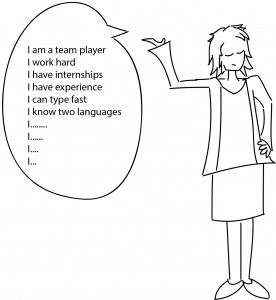 I enjoy a challenge. I am a hard worker with years of experience. I am looking for an opportunity to fulfill my endeavors. I am a team player, a go-getter, a visionary. I am well-qualified and will exceed expectation. And, I am not egocentric.
I enjoy a challenge. I am a hard worker with years of experience. I am looking for an opportunity to fulfill my endeavors. I am a team player, a go-getter, a visionary. I am well-qualified and will exceed expectation. And, I am not egocentric.
If these sentences don’t seem to overstate “I,” step back and take a quick, honest assessment. Too often resumes and cover letters are saturated with the “I-me” syndrome that detracts from a supportive, collaborative intention an employer wants to see shine through in your job application’s language. Overusing “I” is not only stylistically repetitive, but it is also points out a far more important reason to take alarm.
While it is true that young people need jobs, it is also true that there is a heavy criticism overlaying our generation — entitlement. We are often seen as carefree individuals demanding employment because we are simply “entitled” to it. I find this to be a very coarse evaluation. You may take personal offense too, arguing that you have always worked hard and independently toward success. It is important to recognize, however, that this negative stereotype can frequently override an employer’s better judgment.
Gen Y, Generation Me, the Peter Pan Generation, the Millennials: These are the labels students and recent grads today must surmount in their professional lives, whether we accept them or not. To our disadvantage, these descriptors can misconstrue first impressions on our professional behavior and attitude. We are described as narcissistic, self-centered, lax and nonconforming. Where is the redeeming quality?
Unfortunately, there isn’t one sweeping answer. There is, however, a way to tear down these impressions that can be most apparent in the job application. Start with your cover letter in hand. Does almost every sentence begin with I or my? Do any sentences sound remotely “entitled” to the position? If so, you may be succumbing to “I-me” syndrome and only reinforcing Gen Y’s infamous stereotype.
The challenge, then, is to write your cover letter in a way that focuses not entirely on you but more so on the organization to which you are applying. Still hold on to those impressive accomplishments and experiences; these obviously distinguish you as an applicant. Instead, recast them as assets that will benefit and add value to the company in some way. “I have extensive knowledge in social media marketing” can be rewritten as “With an extensive knowledge of Facebook, Twitter, Tumblr, and LinkedIn, my social media skills can benefit your organization in its need for effective online marketing strategies.”
See the difference? Less me, more we. It’s a simple yet powerful shift in language that can help an employer visualize your potential success at his or her own company. Of course, the “we” aspect does not entirely eliminate the “I-me.” It is still important to let your success shine, especially when it comes to a job interview. But what is most important to remember is that the cover letter is all about first impressions — of both your writing ability and attitude. Set side-by-side, a cover letter dripping in “I-me” will certainly lose out against “you-me.”
These “you-me” qualities — collaboration, integration and team-building — are increasingly appealing today as they imply creative thinking, thoughtful feedback and effective communication. Capitalize on these in your cover letter and resume as best you can because almost all recruiters love to see the opportunity for authentic partnership with their employees, and, as the saying goes, there’s no “I” in “we.”

